How to Clean Travertine…and other Natural Stones
Ah, Travertine. You are so pretty but alas, you are stone. How best to clean you without going broke?!
Why is stone being installed in every new and newly remodeled home? From granite to travertine, slate to marble and everything in between – stone. Oh yes, because you are so so pretty.
Stone is like a high maintenance lady. People are attracted to her because of her looks but once you get to know her you see it is not easy being pretty. Nails, hair, waxing, working out, eating all that salad, and making sure it all hits the right angle on the ‘gram. #Oy! Which brings us back to pretty travertine.
I love the look. I even installed a hallway in my last house. However, that hallway was sixteen by four feet long; not too much to maintain. We even put slate into the bathroom surround, again, we went into it knowing we would have to reseal it every year, or so, but the deck and the tub/shower part were all a nice easy to care for cultured marble.
Now, the problem – we have moved into a new house that has so much travertine. Entry hall, kitchen, dining room, study, master bedroom, every bathroom floor, and the entire shower and bathtub walls and floor – even the stairs. Those spiffy little stone specific cleaners they sell at Home Depot and Lowes, in a standard spray bottle, are just not going to cut it at five to seven dollars a pop. We will be buying them weekly (you know, if I actually cleaned all of this travertine…at one time…weekly)!?
So, what is a thrifty homemaker to do?? Internet research, of course.
The Nature of Stone is the Problem
The real problem in cleaning natural stone is in its nature. Stone is porous. Granite is really hard but still porous. It and other natural stones suck up liquid like a sponge. So, the solution is that you seal stone. Good job!? Research over!? Seal it and clean it with whatever is handy!?
Nay, nay Fifi.
Sealants wear off and depending on how often your stone is used, and to what degree, you may need to reseal from every six months to every two years! And, the big kicker, is that even a properly sealed stone may still stain (a.k.a. suck up that wine you spilled and leave a red spot for all of eternity). So, perhaps a five dollar spray bottle is the lesser of many evils – like paying a whole ton of money at once to have the plethora of travertine running amok in my house professionally resurfaced and sealed.
So, stone is porous. It should also be noted that natural stone is basic – as in alkaline, acids & bases, not that it is a simple little rock. Most people paid enough attention in high school chemistry to remember that mixing acids and bases produces a reaction as they try to neutralize. Which, naturally leads us to the inevitable problem that most cleansers are acidic and will eat through your sealant and etch your beautiful stone. So, the occasional reach for good old Windex, 409, or one of their cronies is probably okay, but on a regular basis, it will produce etching.
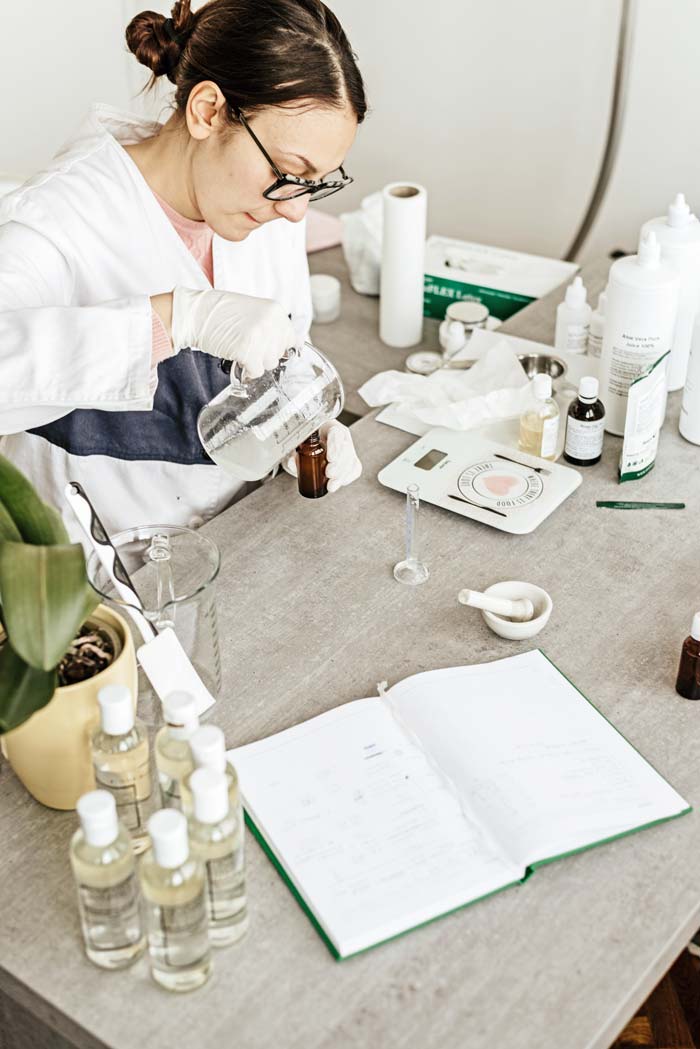
One more drawback of some natural stones is that they can be ‘soft.’ This is especially true of marble but also most other natural stones like Travertine. Granite, as stated and universally known, is very hard but sealants are not. Abrasive agents like brushes, steel wool and anything with a grit will scratch your stone, wear away the sealant, and make etching and staining that much easier.
What Can You Use to Clean Travertine and Natural Stone?
If you are now starting to formulate a plan to go green and cheap with a water and vinegar mix (where my brain first went to – because you can use vinegar for anything, right?) this is the appropriate place to say that vinegar is also an acid and, as such, it needs to stay away from your precious stone.
What can be safely used are products specifically designed for granite and other natural stone. They can be found at online, at home improvement stores, and most grocery stores – this is the “No, duh?” statement. These products range greatly in price and for my purposes are beyond what I want to pay, since I have a very large area to cover. Additionally, they will vary in effectiveness. Some will simply polish and your stone will look great, but will it disinfect and really clean?
So, for you (and me) I scoured the Internet to find that cheap solution. After many hours, Eureka! I found it! The secret solution of affordable, effective cleaning of travertine and other natural stones. The amazing part is it all came down to that basic high school chemistry lesson. We want neutral. That is what stone cleaners are, neutral solutions. And, it was not exactly a secret just something that was rarely mentioned and never disputed. The amazing reveal is isopropyl alcohol (a.k.a. rubbing alcohol) mixed with water. A solution of somewhere between one-quarter cup to one-half cup per quart will clean nicely, effectively and cheaply.
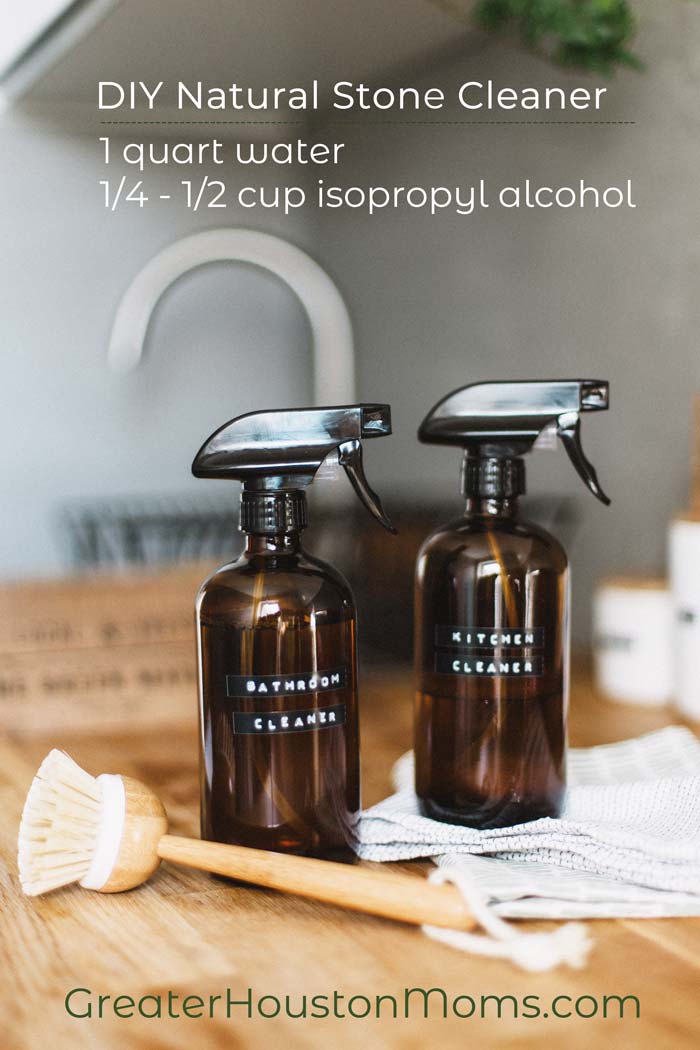
If you hearken back to the days of Chemistry 101, you will recall that the acid/base scale goes from one to fourteen. Neutral is seven. Neutral is good. Whenever you hear of something being “PH-balanced” they are trying to get it as close to seven as possible. Milk is a seven. Isopropyl Alcohol is not technically a seven but, for our intents are purposes, it is neutral (a little confusing because alcohols are not acids or bases).
How to Clean Your Travertine & Stone
Getting down to the nuts and bolts of cleaning a natural stone floor. First, dry mop with a soft cloth or microfiber covered mop to remove debris that can scratch if you start using a little elbow grease.
The grit that drops off of your shoes can scratch your stone. If you really want to go all the way, don’t wear shoes throughout the house. However, with young children, this can be a bit impractical so do your best to remove debris on a regular basis.
If you are cleaning a countertop, such as in a kitchen where daily cleaning is necessary, plain jane hot water will do fine with a once a week cleaning with your preferred stone cleaning agent.
Once your space is clear, clean with the alcohol-water mixture or your agent of choice. If you are using a specific stone cleaner follow their directions but with most, once you apply it mop or wipe and you are done. Dousing the floor is not necessary. To polish take a second cloth and buff until it shines!
Safe and Not Safe
Below is a list of the cleaning agents that are safe and unsafe to use on natural stone.
SAFE:
- Water
- Granite and/or Natural Stone-specific products
- Water and rubbing alcohol mix 16:1 (a.k.a. 1-quart water to 1/4 cup rubbing alcohol)
OCCASIONAL USE ONLY:
- Soap and water mix. Soap scum will build up and dull the stone. (Yes, even if you rinse afterward)
NOT SAFE:
- Bleach,
- Ammonia,
- Vinegar (and water/vinegar mixes),
- generic cleaners and degreasers (Windex, 409, Fantastik, etc.),
- Lemon/Lime/Citrus juice (pretty much anything with a citrus scent),
- Abrasives (steel wool, Brillo pads, brushes, etc.),
- CLR
To Baby Oil or Not to Baby Oil? So many of you have questioned and now I have an answer!
Here is the good news – Travertine, marble, and granite are stone (yes, really!). There is a reason stone has been used as a building material for thousands of years. It is durable and attractive. Stone will outlast most of the materials used to build your entire home. So, in a thousand years, your house may not be standing but your floors and countertops will be (though probably not as pretty). So, put your pretty girl’s face on and enjoy being seen with her.
NOTE: I am not a stone professional, just a simple mom who is sharing her research. I heartily encourage you to do your own research. This is merely what I am doing.
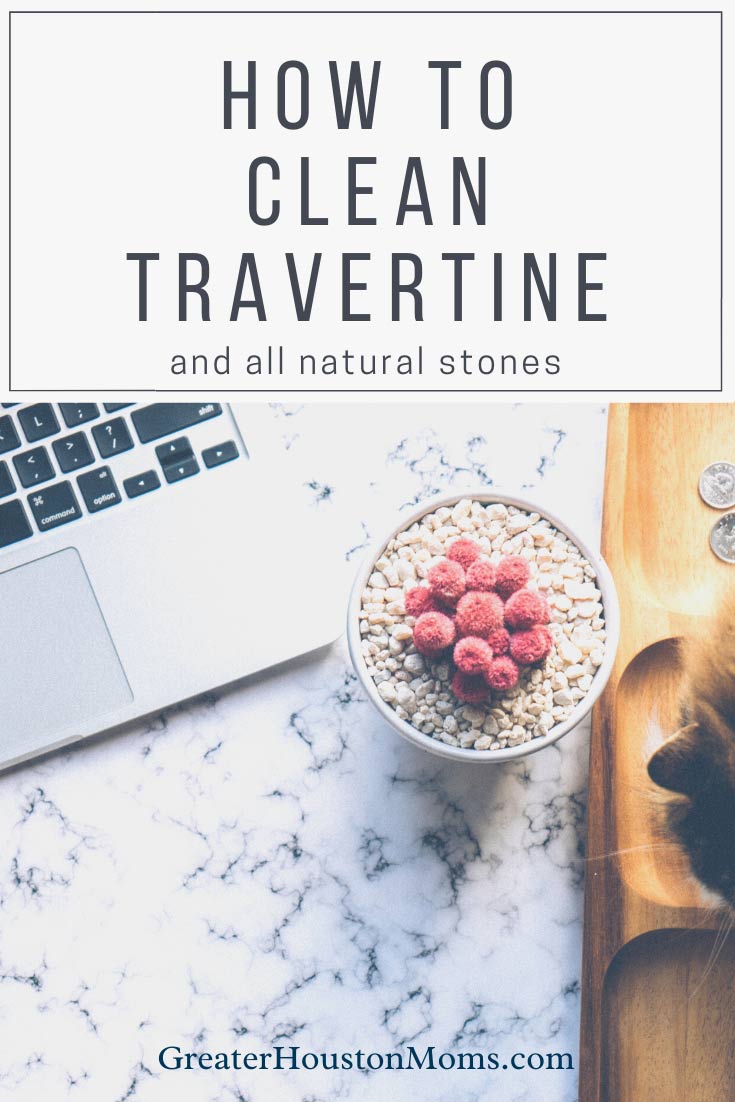


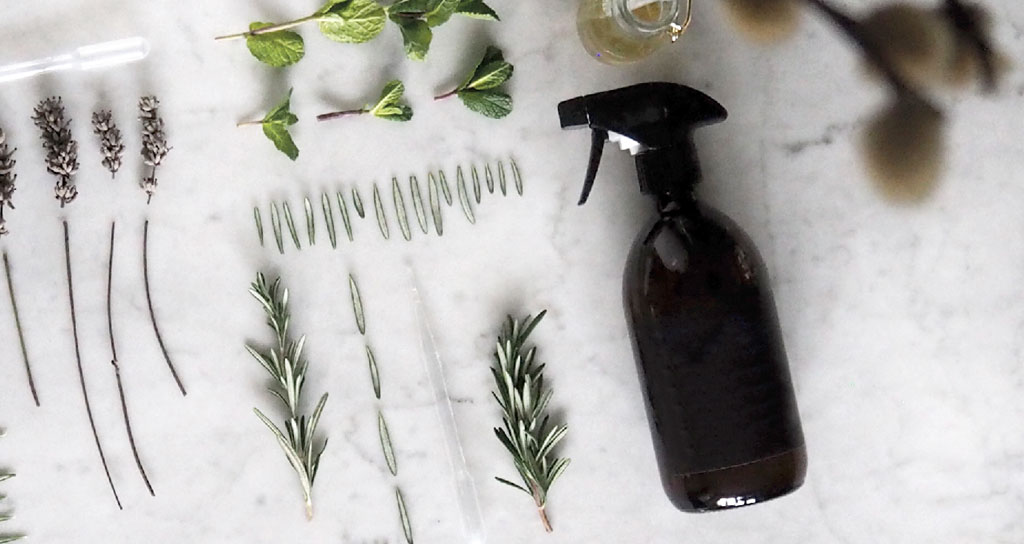
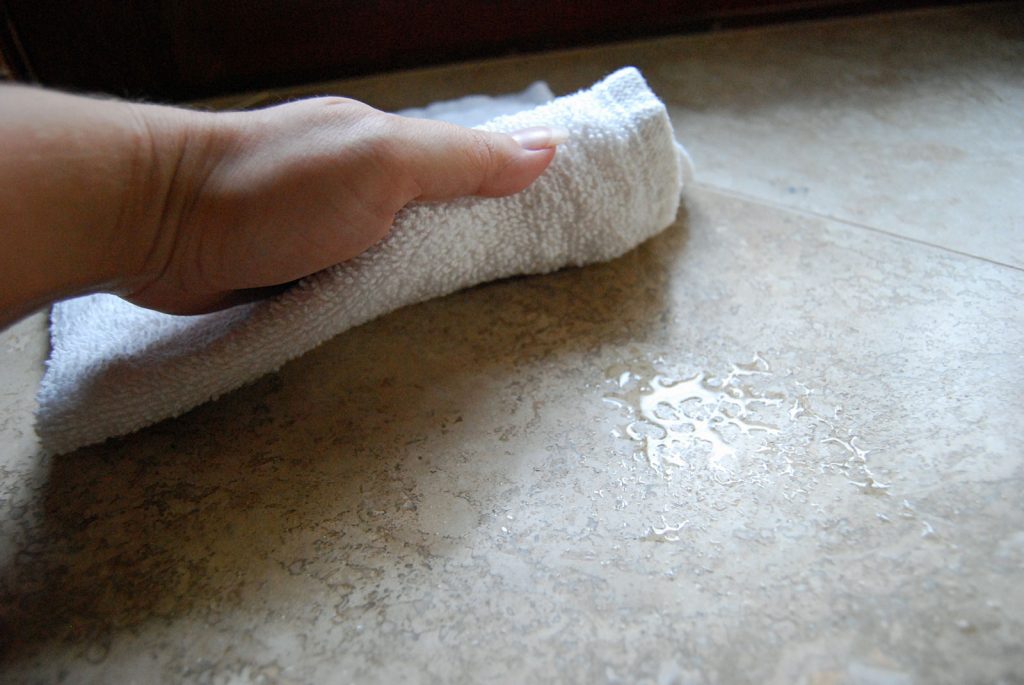
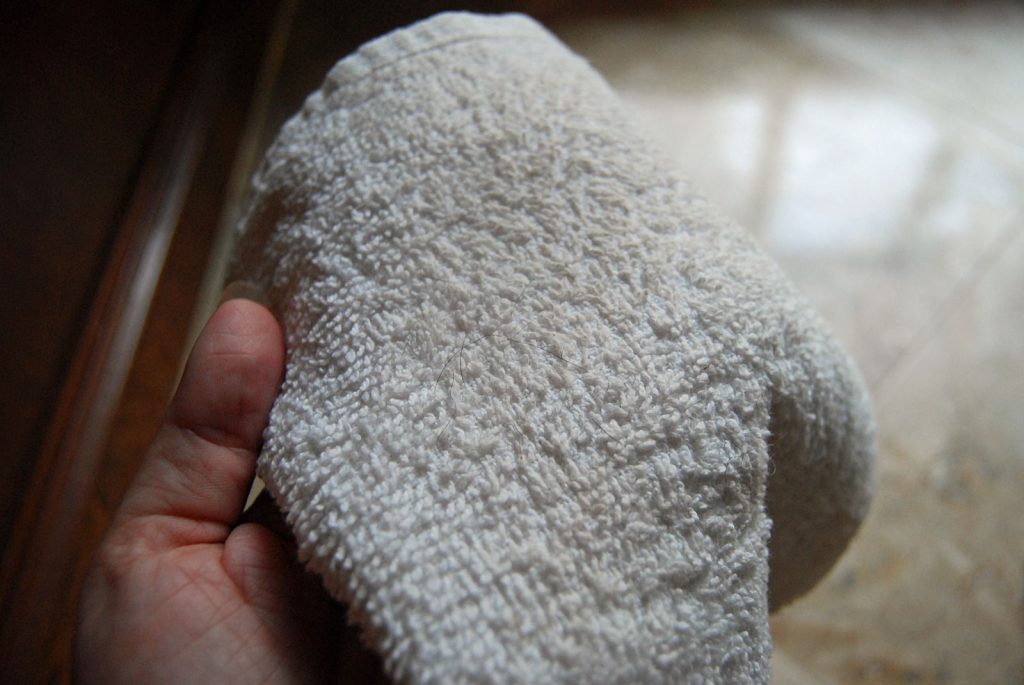
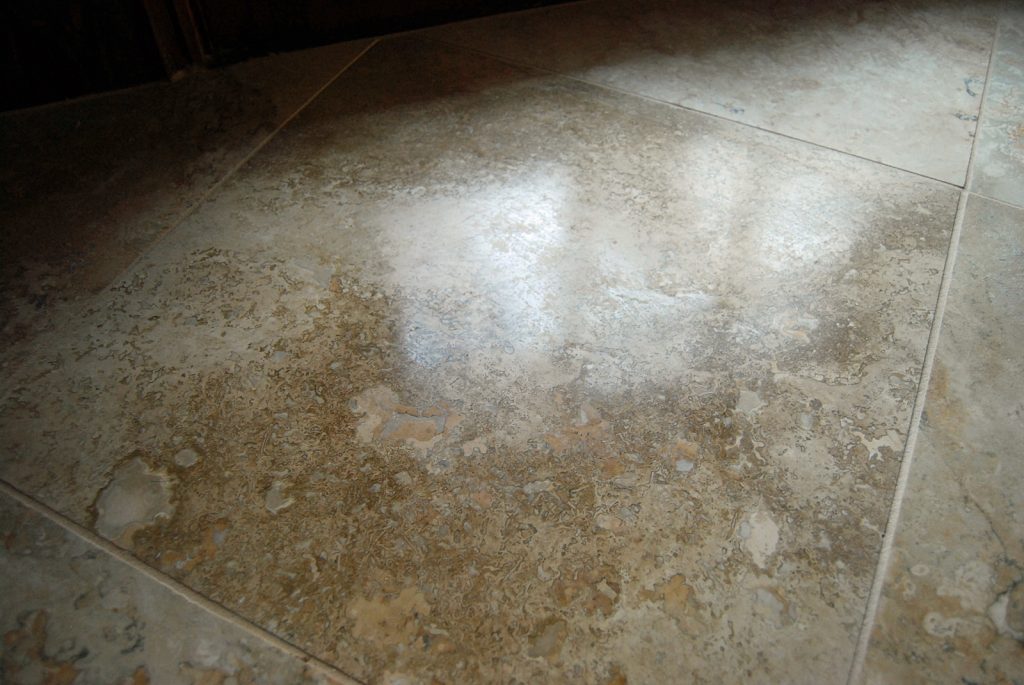
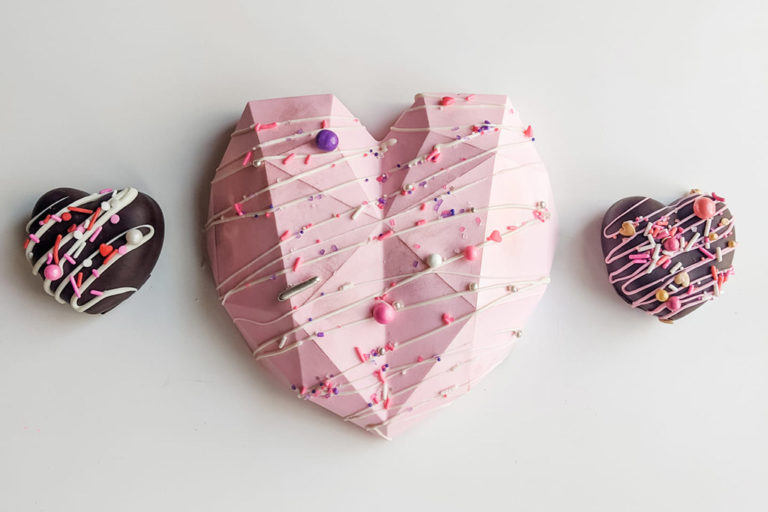



Anyone have a recommendation for a brand name of a soft bristle stand up cleaning brush to use on travertine flooring — so tile does not scratch when being cleaned? All I can find in HD and online are stiff bristled brushes that will mar the stone. TIA.
For just sweeping? Any dry broom should be gentle enough. But the Kelamayi broom’s, reviewer’s say, bristles are really soft (https://amzn.to/47OdDbQ). Personally, we have a little Roomba vacuum that just runs each day. We’ve never had any problems with its wheels or brushes scratching. For mopping, I LOVE LOVE LOVE (cannot believe I love a mop) the Bissell SpinWave (https://amzn.to/3T0AwEM).
I am glad to see this is much effective information. Now, this is the question, Does alcohol/water mixture are effective.
I’ve used it for as 11 years!
Thank you for explaining that the use of things like Windex and 409 on natural stone over time will cause etching. I would love to be able to have better flooring in my home, and I think travertine is the way to go. I will be sure to reference this article so that I can keep it clean once it is installed.
Thanks for the article!
I would think so. It’s completely neutral for your stone so daily use should be fine.
Wondering if you have any recommendations for pet urine. I immediately blotted w paper towels then cleaned w tiny amount of dish soap and water. There is still an odor and it etched immediately. Thanks in advance.
This is some VERY helpful information that I’ve been searching for. Thank you so much! Now, my question, can the alcohol/water mixture be used as a daily shower cleaner for Travertine?
This site is so helpful!! We just moved to a house that has sealed travertine pretty much everywhere except the bedrooms. One of our bathmats was slipping, so I put shelf liner (https://www.amazon.com/Duck-1100731-Non-Adhesive-12-Inch-20-Feet/dp/B002AS9NAI/ref=sr_1_1?s=kitchen&ie=UTF8&qid=1474859739&sr=1-1&keywords=shelf+liner) under the mat to keep it from slipping. Today, I pulled the bath mat up to clean and there is a residue left behind from the liner. Should I try the alcohol/water solution to remove it? Thank you!!!
You won’t hurt it by doing so. You can even soak it down if you need to soften up the residue, a bit. 🙂
Has anybody used “Swiffer WetJet” on their newly sealed Travertine tile floor? I checked the MSDS sheet, and the only ingredient that I see is Ethanol…which is basically alcohol as far as I know.
Thoughts?
I have not but that sounds fine to me too. 🙂
Help! My cleaning lady tried cleaning my travertine showers with CLR, needless to say I now have a white film covering my stone! Will the alcohol mix remove this film?
Thanks, any info will help
Oooooh! That’s not good! The alcohol solution won’t hurt. So you can try it, but she may have etched it and that won’t come off.
What is the most heavy duty sealant that I can buy and use on my total travertine shower, once I get rid of the terrible mold and mildew and pink bacteria? This has been a 3 year battle! Thanks
A couple things.
1) Baby oil has been found to contain formaldehyde (in the USA; but same leading brand sold in Europe, Asia, etc. does not have formaldehyde. I don’t see the good of having bathroom & kitchen counters coated with a product that will off-gas formaldehyde. Plus: doesn’t the oil attract dust? Everything from lint & dead skin cells, to particles wafting in from outdoors? I may try a ‘sample patch’ on counter top (or with a scrap from floor molding) and compare over time.
2) Isopropyl alcohol (rubbing alcohol) is sold in different strengths. At a local dollar store (or similar) I’ve found only bottles marked 50% strength, whereas I recently found 99% strength (which I need to be effective with ears/skin sensitive to nickel) at a major grocer–after only seeing 70% strength on the shelves for months. Now I’m wondering if your ‘effective & safe’ formula of 16 parts water to 1 part rubbing alcohol is using the the 50% concentration or 70% or 99%? And do you used warm/not water or cool? I’ve used rubbing alcohol for years for mirror cleaner, etc. and the weaker solution is ok for that. But with my extensive travertine floors & counter tops, plus the granite counter tops, I would like to be certain of what is recommended. If I use 99% rubbing alcohol, would I still do 16:1 or more like 25:1 or 30:1? If you were using either the 50% or 70% rubbing alcohol for your 16:1 success story, not the 99%, please clarify. Also, what about witch hazel? it has some alcohol in it. I’m fine with the odor of both Witch Hazel & rubbing alcohol. I dislike the heavy scenting of the pricey products sold in spray bottles. Additionally, I ordered a set of products for delivery by mail and what a mess–one of the bottles had a slow leak that turned the cardboard mailing box into a soggy mess, with most of the product leaking out. Not gonna repeat that fiasco.
Did anyone answer the question about what strength alcohol – 50%, 70%, 90% etc??
I’ve not found any difference between alcohol strengths – I have used 70-91%. You could certainly do a slightly different ratio of water etc. but at those levels, I don’t think it matters much. In fact, I’ve gotten to the point where I don’t really even make it precise. I just mix a basic ratio straight into the bottle.
As far as temperature this would make no difference on the effect of the mixture. The only reason I could see it mattering is if you are using it immediately on things that have dried on the counter, but, again, probably doesn’t matter because you could also just pre-clean with warm water.
And as for baby oil, it become quite a hot topic so I’ll address it separately in a new post.
This is just wonderful information!!
What about grout? The same formula? Does it need to soak?
I’ve not noticed any difference in letting it soak. I would just spray and wipe.
Grout is a different ball game. For general cleaning it should be fine but once it gets mold/ mildew in it you’ll need to upgrade your system a bit. If you don’t care what you use hit it with something containing bleach – that will kill it at the root and may be what you’ll have to do in any case, depending on how bad your mildew/ mold issue is. If you are looking for a natural and gentle grout cleaner the first step would be to just scrub it with a little brush (I got the OXO Good Grips Deep Clean Brush Set – the bristles are stiffer than a toothbrush) and your cleaner and it should come off. If you need a little more: mix your cleaner with some baking soda or sprinkle baking soda directly on it and scrub away. If you are having mildew/mold you can’t seem to get rid of when you clean normally every week or two then it may be time to reseal your grout. Make sure you get rid of the mold/mildew first or you will just seal it in an always have little black spots – this may be the time to resort to bleach or something of the ilk. The occasional use of something that abrasive should be okay for your stone (once or twice a year, not once or twice per month). I wouldn’t let it soak any longer than you need to though. So, get rid of the mildew, let it get completely dry, and seal or reseal your grout.
Just wanted to make a quick suggestion – if you are needing to use a harsher, acidic product to remove mildew/mold/soap scum, please make sure to neutralize it before resealing your stone. My company sells products specifically for stone by Stone Pro and we also do restoration work. If the acidic product is not neutralized using a neutral cleaner – I would normally recommend our Crystal Clean but the water/alcohol mix might work – the acid will continue to be reactivated and could seriously damage your stone.
Been looking for advice for 10 years w/o someone trying to sell me products – I AM PACIFIED!
We have a large walk in shower that is totally (ceiling and floor) travertine. The contractor sealed it with a seal that is supposed to last for decades but we are plagued with red slimy stuff that I assume is soap scum. We also get mildew in the grout. It’s getting harder and harder to scrub it down and I’m wondering if we can just spray this alcohol solution on it to remove these things? If so, do we scrub it down after it’s been sprayed on or just rinse it with the handheld shower spray? How long do we leave it on? Any help you can offer is *greatly* appreciated!
I don’t believe just spraying it will work. Mildew, mold and the slime have to be removed manually. I know there are some spray and rinse products out there, but they are going to have chemicals and bleach which aren’t great for natural stone. But, it’s your stone so if all that is really bothering (and it would bother me!) you may try it and then reseal. At that point you could then return to your more gentle cleansers. I have yet to find a sealer that seals (especially grout) for more than a year or two. And, once the mold gets into the grout you will have to use something that can penetrate and really remove it before you seal it again.
Thank you so much for your answer!
How do you clean the grout between 2 x 2 squares of travertine? We have soap scum build up on the bottom of our shower floor which is made up of 2 x 2 squares of travertine and grout. Any help would be appreciated!
That pink slime is bacteria. I found this “The pesky growth thrives in damp environments like bathrooms, and feeds off common toiletries, such as soap and shampoo”.
It’s called pseudomonas bacteria
Great info! We are in the process of buying a house with travertine. Do you think I could use a steam cleaner on it? I don’t own one, but saw that hot water was the preferred method.
I bought a steam cleaner just for cleaning travertine in the shower of the house we just purchased. I tried it out today – the shower is full of mildew and is really gross. The steamer worked fairly well but it’s very time consuming. I saw a demonstration on youtube using a steamer to clean a travertine shower. I also read somewhere that you shouldn’t seal a travertine shower. Does anyone else know anything about this? Also will the alcohol work to to clean the very dirty kitchen floor. The entire first floor is all travertine. It’s 10 years old and I don’t think it’s been maintained well.
I seal mine with a stone sealer every two years, at least. I seal the grout with grout sealer. It’s the only way I know to help keep the mildew out of the grout. The alcohol should work fine to clean the kitchen – sounds like you might need some elbow grease. Perhaps your steamer?
Engineered, hardwood and tile floors can be cleaned with mixture of vinegar/water.My flooring installers have told me this for years and I have done it for years with great results. Just don’t let the water puddle. I keep a spray bottle ready.
Iv been looking for a safe cleaner for natural stone for a while now. I am a professional cleaner.and one of my new clients let there stone shower go for a long time. and i needed something to keep it clean in between cleans.. plus i don’t like to use harsh cleaners or chemicals at all any more.. thanks. I think the alcohol act as a inhibitor towards mold and mildew regrowth as well. Im pretty sure i read that some where during my search.
I have limestone floors and will give this a try. I also have another problem with my stamped concrete floor in our basement. Maybe someone will have an idea. My daughter put an anti slip mat under a large rug (our floors are heated). When we went to lift it up it was stuck on like glue (probably cause of the heat). Ended up using a putty knife to scrape the mat off. Have tried several items to get this residue off with no results. Anyone?
Is it safe to assume you’ve tried Goo Gone? I know it is the usual go-to for removing weird things. The only other thing that comes to mind (though may be redundant since you have heated floors) maybe try getting down there with a blow drier to see if you can get it to soften back up. Otherwise I would try to find something that would rehydrate it -my knee jerk response would be something oil-based but that may leave a stain on concrete. Or, maybe a baking soda paste and some elbow grease. Good luck, let us know if you figure it out.
This article is a lifesaver….and well written! Thank you!
And porcelain floors?
Porcelain is pretty hardy to everything so I don’t see any reason that alcohol should be avoided.
This is AMAZING information! Thank you! I just want to verify…..is the rubbing alcohol/water mix also safe for marble floors, as well as the granite and other “natural stones”?
It should be safe for all natural stone. I use it on my travertine and granite. But, I’m not a doctor 🙂
Ok, thank you for this information. I’m married to a Chemist and so I get ph and how it runs the world. I can also add what I do to bring back the shine to our natural stone slab stone in our bathroom. After it’s cleaned I use baby oil on a soft cloth rub it in and it acts as a sealant without the toxic fumes. It’s amazing.
Awesome, I’ll have to give that a try!
Thank you so much for this helpful and inexpensive way to clean travertine. I already see holes, the size of a quarter in the floors and looking for ways to patch it up too. I’m curious, did the baby oil work? Since my tavertine is in the living room and kitchen area, do you think it’s a good idea to lightly rub baby oil for that area? I really appreciate your opinion and tips.
I’m so glad I found your site.
You’re welcome, glad it helps. As to the baby oil, I have not tried it. From what I can tell the baby oil will not hurt your Travertine. It is mostly made of mineral oil, so if you are looking for an inexpensive sealer it may work, but I would think only if your stone is not already sealed. Baby/ Mineral oil is ph neutral and is used in the curation of stone artifacts that are in good shape (not chalky or chipping). If you are however looking to it as a “natural” you may want something else (particularly if you have children crawling around) since mineral oil poses some health concerns and clogs pores etc. Though, loads of people use food grade mineral oil to seal their butcher blocks and wood cutting boards – there’s good odds it won’t hurt a thing.
The holes are not going to be helped with mineral oil. We recently had more travertine installed and it is a more rough finish and has some of these holes. We chose to leave them unfilled but our contractor did give us the option and said they are part and parcel to owning travertine. The flooring pictured in the post has a polished finish and has developed some of these holes in the high traffic areas. Its much more noticeable and we may fill those. I’m fairly certain you can just use matching grout and fill the holes up and then seal them in.
I have travertine floors on the majority of my house and for holes, I found a filler specifically for travertine which is found in your local home improvement store (found mine @ Home Depot, my new best friend =))))). Two tones included, play with them to find the right mix.
HumanPacifier
Thank you for this inexpensive, practical tip. I will certainly try it.
I know the alcohol/water works for granite. I will try it on my quartz. Now, does the baby oil step work on quartz for shine?
How about petroleum jelly?
I read a lot of interesting content here. Probably you
spend a lot of time writing, i know how to save you a lot of
time, there is an online tool that creates high quality, google friendly articles in minutes, just search in google – laranitas
free content source
Please someone help! I just had my Travertine floors refinished (the original builder did not use the right sealer) and the guy who just did them did and ok job but around the edges there is a white haze from the machine he used. I have tried several products to get it up. It works for a few minutes and then it comes back. Any Suggestions. Donna
The bad news, from what I can tell there is no easy fix to this. It sounds like he may have not gotten a bit heavy handed with your sealant. Aside from having someone come in and professionally buff it out perhaps a little time will wear it off (since you typically have to reseal every two years, maybe as long as you make it part of the cleaning routine – make sure you get those edges when you mop – it may wear off eventually).
I will try this.Thank you.
Thanks will try this.
Thank you so much. I can’t tell you enough how much I appreciate your priceless knowledge, research and information. We have 2,000 sq ft of travertine and it is exactly like a high maintenance beautiful woman. I ask people all the time to please take their shoes off since I clean it on my hands and knees. crazy but true.
Thank you for everything
I have been using all that Vodka we get for Christmas every year using the same ratio as alcohol 1/4 cup tp 1 quart waqter.
I was thinking alcohol would work – thanks for the post. FYI to all – alcohol works great on granite counter tops and windows as well!
Great tips,thanks for the post.
Many thanks so significantly for bringing this all together, you rock woman.
Great information! I’ve been looking for something like this for a while now. Thanks!